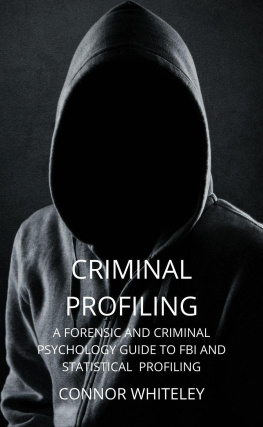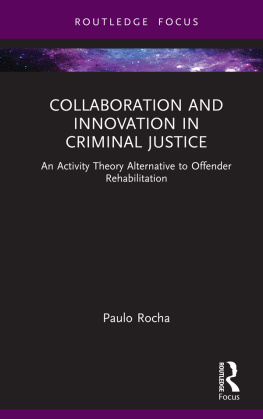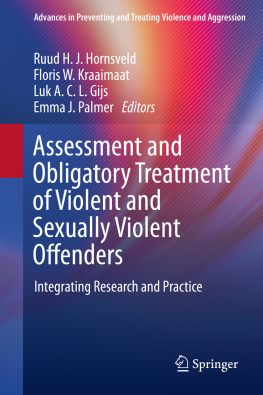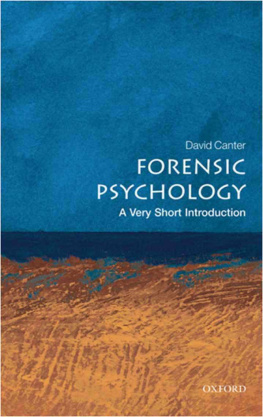Foundations of Offender Rehabilitation
This book forges a much-neglected link between etiological theories and rehabilitation models, risk assessment, formulation and treatment planning. It provides an integrated resource that will improve the conceptual competence of those in training, post-qualification professionals who are looking to make the transition into forensic practice and programme designers alike.
Devon Polaschek, Associate Professor, Criminal Justice Psychology, Victoria University of Wellington, New Zealand.
The past three decades have seen dramatic changes in the way in which the criminal justice system responds to those who break the law. The old claim in the field of correctional psychology that nothing works has strongly been refuted in the face of evidence that rehabilitation programmes do make a difference. The graduate student in forensic psychology could easily be overwhelmed by the plethora of information now available.
This new textbook offers a comprehensive approach to forensic and correctional psychology, demonstrating how theory and practice can be applied and integrated. Written by internationally recognized experts within the field, the authors guide the reader through the core theories and concepts that underpin forensic practice within the legal systems of different countries (UK, USA, Canada, Australia and Singapore), show how this knowledge informs current thinking in offender rehabilitation and reintegration and provide a series of case studies looking at sexual offenders, female offenders, juveniles and offenders with mental disorders.
This book is the perfect overview for graduate students of forensic and correctional psychology engaged with offender rehabilitation and assessment and the psychology of law.
Sharon Casey is a Senior Lecturer at Deakin University and member of the Clinical Forensic Group within the Deakin Forensic Psychology Centre.
Andrew Day is Professor in Forensic Psychology and Director of the Forensic Psychology Centre at Deakin University.
James Vess has over 25 years of clinical and research experience with forensic populations. He is a Senior Lecturer and a member of the Forensic Psychology Centre at Deakin University.
Tony Ward, MA(Hons), PhD, DipClinPsyc, is Professor of Psychology at Victoria University, Wellington, New Zealand.
Foundations of Offender Rehabilitation
Sharon Casey, Andrew Day,
James Vess and Tony Ward
First published 2013
by Routledge
2 Park Square, Milton Park, Abingdon, Oxon, OX14 4RN
Simultaneously published in the USA and Canada
by Routledge
711 Third Avenue, New York, NY 10017
Routledge is an imprint of the Taylor & Francis Group, an informa business
2013 Sharon Casey, Andrew Day, James Vess and Tony Ward
The right of Sharon Casey, Andrew Day, James Vess and Tony Ward to be identified as authors of this work has been asserted by them in accordance with the Copyright, Designs and Patent Act 1988.
All rights reserved. No part of this book may be reprinted or reproduced or utilised in any form or by any electronic, mechanical, or other means, now known or hereafter invented, including photocopying and recording, or in any information storage or retrieval system, without permission in writing from the publishers.
Trademark notice: Product or corporate names may be trademarks or registered trademarks, and are used only for identification and explanation without intent to infringe.
British Library Cataloguing in Publication Data
A catalogue record for this book is available from the British Library
Library of Congress Cataloging in Publication Data
A catalog record has been requested for this book
ISBN: 978-0-415-67916-9 (hbk)
ISBN: 978-0-415-67917-6 (pbk)
ISBN: 978-0-203-12681-3 (ebk)
ISBN: 978-1-136-45851-4 (epub)
Typeset in Times New Roman
by Cenveo Publisher Services
Contents
Guide
About the authors
Dr Sharon Casey
Sharon Casey is a Senior Lecturer at Deakin University and member of the Clinical Forensic Group within the Deakin Forensic Psychology Centre. She was formerly Programme Director of the Master of Psychology (Forensic) programme at the University of South Australia. Her research interests include substance use, juvenile offending, scale development and validation, and psychology and the law. Dr Casey has worked extensively with correctional agencies both in Australia and overseas in the development, provision and evaluation of offender rehabilitation programmes and the provision of training. She currently holds an Australian Research Council Linkage Grant (in conjunction with Corrective Services New South Wales) undertaking a longitudinal analysis of recidivism rates for offenders completing substance use rehabilitation programmes across different treatment modalities.
Dr Andrew Day
Andrew Day is Professor in Forensic Psychology and Director of the Forensic Psychology Centre at Deakin University. He has a clinical background, previously working as a clinical and forensic psychologist in both the UK and Australia and is particularly interested in the application of psychological thought and practice to the correctional setting. Professor Day is a member of the Australian Psychological Societys Colleges of Clinical and Forensic Psychology. His current research interests centre around the development of therapeutic regimes within prison settings, effective practice with offenders from Aboriginal and Torres Strait Islander cultural backgrounds in Australia, and the role that anger plays in aggressive and violent behaviour.
Dr James Vess
James Vess has over 25 years of clinical and research experience with forensic populations. He received his PhD in clinical psychology from Ohio State University in the United States, and then served in a variety of treatment, assessment and supervisory roles at Atascadero State Hospital, the maximum security forensic psychiatric facility in California. He was subsequently a Senior Lecturer at Victoria University of Wellington, New Zealand and Deakin University in Victoria, Australia, where his research has focused primarily on risk assessment with violent and sexual offenders, as well as public policy dealing with high-risk offenders. He has remained active in forensic practice, and has provided expert witness evidence in a variety of High Court and Court of Appeals cases for Preventive Detention and Extended Supervision in both New Zealand and Australia. He is now a subject matter expert and project manager at the National Center for Telehealth and Technology in the Madigan Army Medical Center at Joint Base Lewis-McChord in Tacoma Washington.
Dr Tony Ward
Tony Ward, MA(Hons), PhD, DipClinPsyc, is currently Professor of Clinical Forensic Mental Health at Deakin University, Melbourne Australia. He was formerly Director of the Kia Marama Sexual Offenders Unit at Rolleston Prison in New Zealand, and has taught both clinical and forensic psychology at Victoria, Canterbury and Melbourne Universities. He has authored over 300 academic publications and his research interests include the rehabilitation and desistance process in offenders, cognition and offenders, evolutionary approaches to crime, and ethical issues in forensic and correctional psychology. Professor Ward is the developer of the Good Lives Model (GLM) and has published numerous books, book chapters and academic articles on this model since 2002. He is currently working on a research project with Dr Gwenda Willis and Dr Jill Levenson investigating the degree to which North American treatment programmes for sex offenders adhere to the basic conceptual underpinnings of the GLM.










